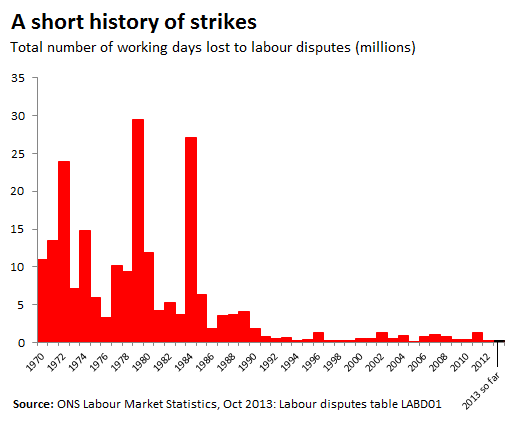Have strikes cost the UK £400 million?
"2 million lost days: militant unions cost economy £400 million with strikes"
The Sun, 18 October 2013
What do firefighters, teachers, and postal workers have in common? They've all been on or announced strike action in the past fortnight. And as the Sun's coverage this morning shows, the headlines don't look like they're going away any time soon.
The newspaper put a £400 million price tag on actions such as these that have taken place since 2010.
Part of the headline is easy to verify: the Office for National Statistics (ONS) estimates about 1.9 million working days have been lost to 'labour disputes' from May 2010 to August 2013.
The largest chunk of these by far came in November 2011 when about a million working days were lost, mainly as a result of mass public sector strikes that recieved wide coverage at the time.
Even this pales in comparison to days lost during the 1970s. At the peak of industrial disquiet, 29,500,000 days were lost in 1979.

Be that as it may, how do we get from almost two million lost days post-2010 to a cost to the economy of £400 million?
It's unclear where the Sun's figure might have come from, but we can try to get there by using our own calculations, based on official stats.
The most obvious method is to look at labour productivity - the volume of goods and services a worker produces in a certain amount of time. Finding the total value of what the average worker produces in a day would give us some idea of what 1.9 million lost working days would mean in terms of lost value for the economy.
A crude way of doing this is to look at GDP per hour worked in the economy. Gross Domestic Product - the total value of goods and services produced in the economy - is currently about £1.5 trillion (£1,500 billion). Divide that by the total number of hours worked in the UK in a year - about 49 million, gives you a figure of around £30 added to GDP for every hour worked.
Assuming the average person works 6.4 hours in a working day, that's £191 per working day. With 1.9 million of those lost, that's a total cost of £370 million since the 2010 General Election.
This is definitely little more than a back-of-the envelope calculation, not least because the kinds of workers that will have been involved in these industrial disputes won't necessarily confirm to the 'average'. Just one notable characteristic of those involved in lost working days is that they've overwhelmingly based in the public-sector.
It's also worth keeping the figure in some perspective. After all, coming in at the equivalent of about £125 million a year, it's not much more than an amount the BBC's Nick Robinson describes as "a little bit like a fiver dropped on the floor of the treasury".